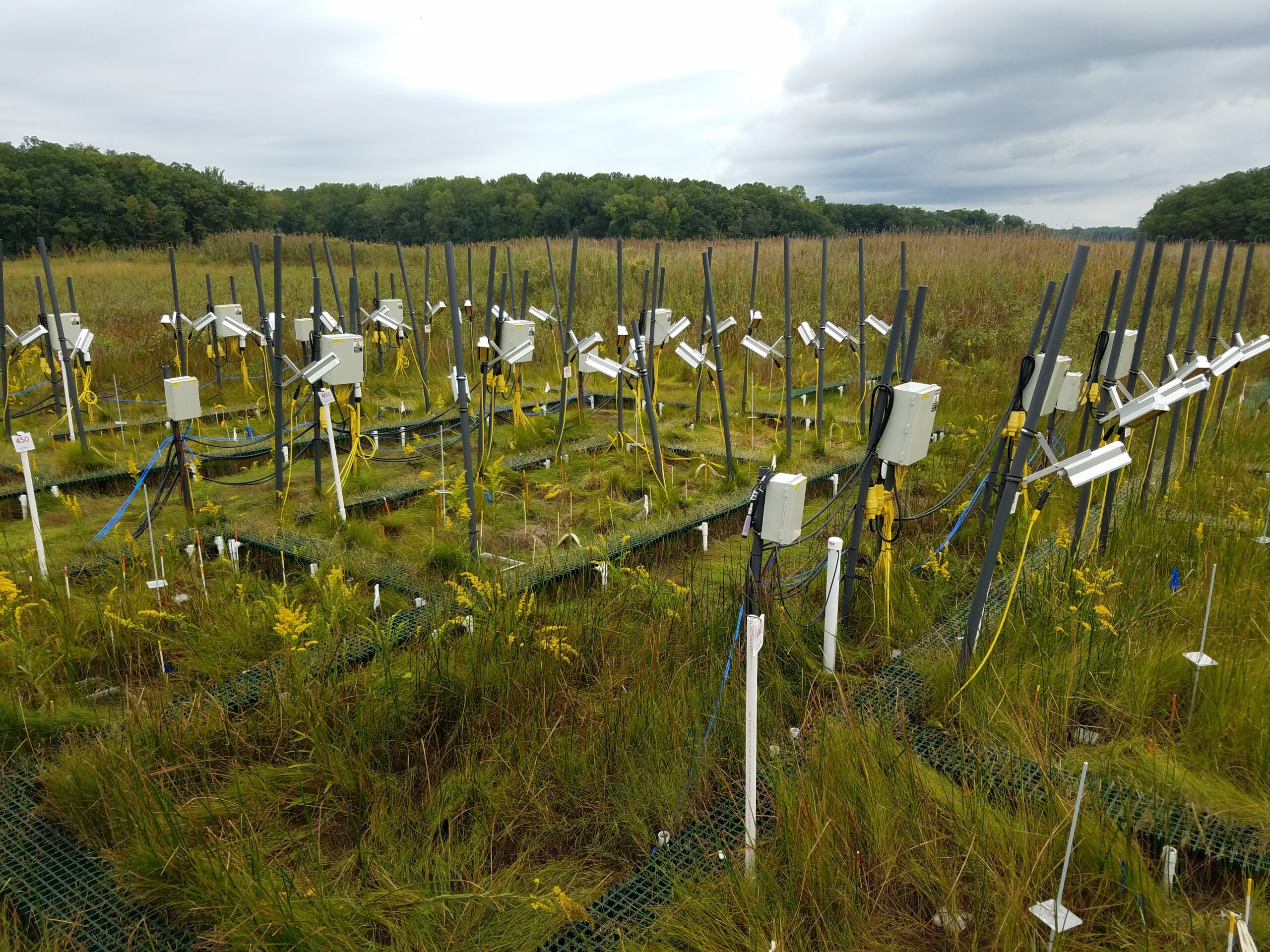March 03, 2022
Elevated Temperatures Are Temporarily Beneficial for Coastal Ecosystem Resilience
Experimentally elevating temperatures in marshes revealed that moderate warming optimizes both marsh resilience and carbon accumulation.

Aboveground heating apparatus and boardwalk among the flowering C4 plant, Solidago sempervirens, at the Salt Marsh Accretion Response to Temperature Experiment (SMARTX) within the Smithsonian’s Global Change Research Wetland (GCREW).
[Courtesy Smithsonian Environmental Research Center.]
The Science
Scientists used a whole-ecosystem warming experiment to increase temperatures in a salt marsh to examine how future warming affects ecosystem and soil quality. By measuring changes in elevation, they were able to estimate if warming is beneficial or detrimental to ecosystem resilience and function as sea levels rise.
The Impact
Future temperatures were observed to increase salt marsh resilience and carbon storage at moderate amounts of warming, where optimized root productivity increased elevation and belowground biomass, but as rates of decomposition accelerated with increased temperatures, results showed evidence of marsh elevation loss and exacerbated break-up of the marsh surface. Therefore, future temperatures may be temporarily beneficial for marsh resilience and function, but projected end-of-century temperatures are likely detrimental to marshes.
Summary
As sea levels rise, ecosystems near the coast become increasingly threatened by drowning. Some ecosystems, like salt marshes, are able to survive rising sea levels by increasing their elevation through root growth and sediment capture. However, sea level rise happens simultaneously as global temperatures increase. Therefore, interactions between higher temperatures and the marsh ecosystem could affect a marsh’s ability to survive higher sea levels. From this experiment where both the surface and 1-meter deep soils of the marsh ecosystem were heated, results revealed that a slight amount of warming was beneficial to the marsh because increased root growth elevates the marsh surface. Meanwhile, high amounts of warming were detrimental to the ecosystem because decomposition decreased marsh elevation quicker than root growth increased elevation. Additionally, marsh elevation loss observed at higher temperatures was associated with increased carbon mineralization and increased microtopographic heterogeneity, a potential early warning signal of marsh drowning. Maximized elevation and below-ground carbon accumulation for moderate warming scenarios uniquely suggest linkages between metabolic theory of individuals and landscape-scale ecosystem resilience and function, but this work indicates nonpermanent benefits as global temperatures continue to rise.
Principal Investigator
Alexander J. Smith
Virginia Institute of Marine Science, William & Mary
ajsmith@vims.edu
Co-Principal Investigator
J. Patrick Megonigal
Smithsonian Environmental Research Center
megonigalp@si.edu
Program Manager
Daniel Stover
U.S. Department of Energy, Biological and Environmental Research (SC-33)
Environmental System Science
daniel.stover@science.doe.gov
Funding
Funding for this project was provided by the Biological and Environmental Research (BER) Program’s Environmental System Science (ESS) program within the U.S. Department of Energy’s (DOE) Office of Science and with support from the Smithsonian Institution, the USGS Ecosystem Land Change Science Program, and the National Science Foundation.
References
Smith, A. J., et al. "Temperature Optimum for Marsh Resilience and Carbon Accumulation Revealed in a Whole Ecosystem Warming Experiment." Global Change Biology 28 (10), 3236–45 (2022). https://doi.org/10.1111/gcb.16149.

